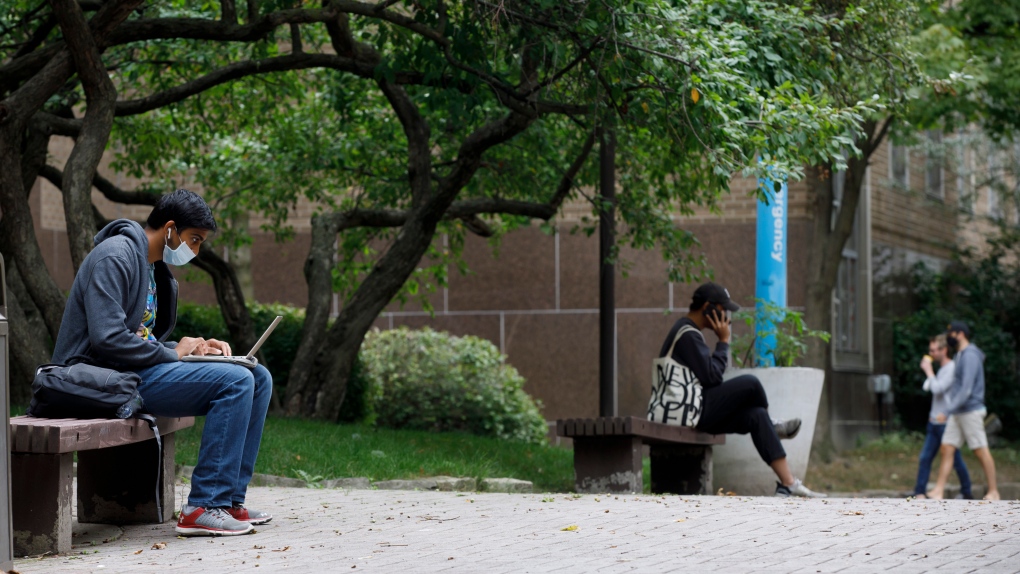Ontario extends post-secondary tuition freeze for third year
 People are seen lounging on Ryerson University campus in Toronto, Tuesday, Sept. 8, 2020. THE CANADIAN PRESS/Cole Burston
People are seen lounging on Ryerson University campus in Toronto, Tuesday, Sept. 8, 2020. THE CANADIAN PRESS/Cole Burston
Ontario will be extending its post-secondary tuition freeze for a third year.
The government made the announcement in a news release, saying that the 2019-20 tuition freeze will be extended again through the 2022-2023 academic term.
“Our government recognizes that students and their families make huge sacrifices to attend college and university, so our government will continue to look for ways to reduce financial barriers for learners,” Jill Dunlop, Minister of Colleges and Universities, said in a statement.
“By freezing tuition for another year, we are saying yes to ensuring that students have access to affordable, high-quality postsecondary education, and reducing the financial strain on families who have already faced so many challenges throughout the pandemic.”
In the statement, the government touts a “historic” 10 per cent reduction in tuition for 2019, something they say has saved students about $450 million annually when compared to costs the previous year.
At the same time, the province also eliminated free tuition for low-income students through the Ontario Student Assistance Plan. Instead, students with a family income of $50,000 and below will receive a mix of grants and loans, that will need to be repaid to the government.
They also reduced the annual income threshold for OSAP repayment from $35,000 to $25,000—meaning that upon graduating, once a student makes $25,000 they will have to start paying back the money they borrowed.
The six-month grace period on interest was also eliminated.
The 2019-2020 tuition freeze was extended last year due to the COVID-19 pandemic but did not apply to out-of-province or international students.
CTVNews.ca Top Stories

Five years after toddler's brutal death, Northern Ont. family struggles to find peace, justice
A North Bay family is struggling to find peace and justice as the five-year anniversary of the brutal death of toddler Oliver McCarthy approaches.
Alberta RCMP officer charged with 2 counts of sexual assault
Const. Bridget Morla, a Leduc RCMP officer, has been charged with two counts of sexual assault in connection with an incident that happened two years ago.
Ontario dad removes hockey rink at heart of neighbour dispute
A Markham dad who drew the ire of neighbours and the city after installing a hockey rink in his backyard says the rink has now been taken down.
Kingston, Ont. doctor in 'disbelief' after being ordered to repay $600K for pandemic vaccination payments
An Ontario health tribunal has ordered a Kingston, Ont. doctor to repay over $600,000 to the Ontario government for improperly billing thousands of COVID-19 vaccinations at the height of the pandemic.
Canadian among three climbers missing on New Zealand's highest peak
A Canadian is among three climbers missing after they'd planned to climb New Zealand's highest peak.
Motivated by obsession: Canadians accused in botched California murder plot in police custody
Two Canadians are in police custody in Monterey County, California, after a triple stabbing police say was motivated by a B.C. man's obsession with a woman he played video games with online.
Trump demands immediate release of Oct. 7 hostages, says otherwise there will be 'HELL TO PAY'
President-elect Donald Trump is demanding the immediate release of the Israeli hostages still being held in Gaza, saying that if they are not freed before he is sworn into office there will be “HELL TO PAY."
Negotiations between Canada Post, union still on hold
The Canadian Union of Postal Workers says a new framework for negotiations that Canada Post presented over the weekend moved closer to the union's position on some issues, but that it remains far from what members could ratify.
Assembly of First Nations special chiefs assembly kicks off in Ottawa
The Assembly of First Nations is hosting a special chiefs assembly in Ottawa today with child welfare, economic reconciliation and First Nations policing on the agenda.

































